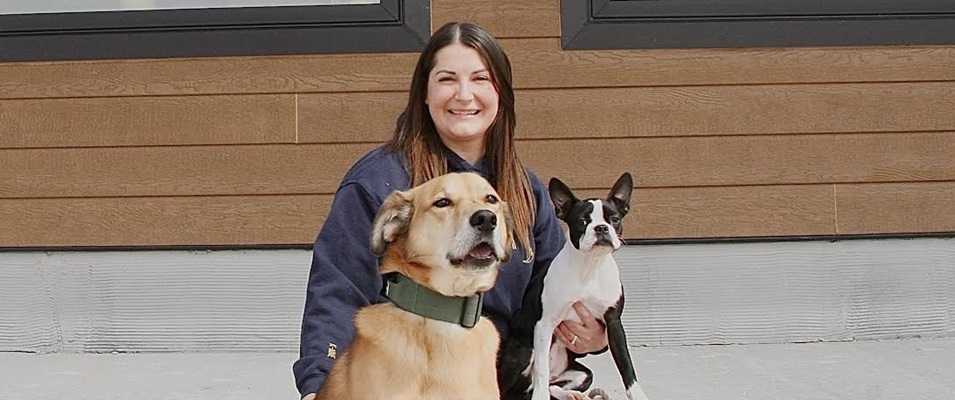
If you’re looking to incite passion among dog lovers, propose a dog-breeding operation in southeast Manitoba. That, at least, is what’s taken place on numerous occasions in our local municipalities over the past few years, the RM of Ritchot being among the most recent.
On July 18, Ritchot’s council voted in favour of accepting a conditional use application by Svetlana and Nikolay Shkhov to allow a Shiba Inu dog-breeding operation on their 3.5-acre lot on Highway 75. Council required that the requested number of dogs be reduced from 20 to 15 and that the applicants comply with all the applicable municipal bylaws, including licensing and registering of the dogs with the RM office. As well, the applicants were required to erect a four-foot fence around the rural property and provide proof of a provincial inspection. Council reserved the right to review the application in five years’ time and to perform site audits to ensure compliance.
What followed the decision, however, was a veritable backlash on a number of the RM’s community Facebook groups. Emotions ran high for many residents, some calling it a puppy mill and others stating that there is no place in the RM for a dog-breeding business when there are already so many puppies waiting to be adopted.
Emails, letters, and a petition soon rolled into the municipal office.
Tracy Mac, founder of a Manitoba dog rescue, wrote an open letter to the RM, clearly angry over council’s decision. She suggested that breeding operations provide miserable lives for the adult dogs, and the offspring only serve to add to an already out of control problem in Manitoba.
“You see, we’re tired,” Mac wrote. “We’re tired of hungry, cold, injured, sick, and stray dogs who will never receive rescue assistance because there are not enough homes for all of them. We’re tired of looking into their pleading eyes, tired of pushing them out of our vehicles, tired of leaving them behind. Tired of crying about lives we couldn’t save, tired of being unable to prevent more from being born, tired of being too late, and we’re really, really tired of trying to fix all of this on our own.”
Mac recommended that a better approach would be to open facilities to keep existing dogs safe until they can be adopted.
“What we do need are community leaders to step up and recognize we need their help and support,” she added. “Your voices [as members of council] are more powerful than ours.”
A petition against the breeding operation quickly began circulating online as well, started by Rachelle Levesque Bowes, vice chair for Strays That Can’t Pay out of New Brunswick. Within hours, signatures were coming in from all over the country, and even from international locales. Within weeks, the petition carried almost 900 signatures and continued to climb.
Ritchot Mayor Chris Ewen was quick to respond. He noted, in a response to one concerned party, that among the main reasons for council’s decision was a lack of public opposition to the proposal. Also, council didn’t wish to demonstrate prejudice towards an applicant who had no known prior reports of cruelty or negligence.
“As a municipal council, our role is to review all applications for conditional uses that are submitted and to conduct due diligence before making a decision,” Ewen told The Citizen. “We understand there is some local interest in this issue and a great deal from outside our municipal boundaries. Like all councils, we monitor all of our decisions and respond as quickly as we are able to get feedback from our citizens.”
Barry Piasta, founder of a local dog adoption Facebook group and long-time dog welfare advocate, is confident that if due diligence was performed by elected officials, these kinds of operations would no longer be permitted.
“By suggesting that it’s a small business, you know that they’re not in it for the betterment of the breed,” says Piasta. “We don’t need those kinds of businesses. Would [councils] be okay with an ammunition shop or an adult video store? Is that okay? So how come it’s okay to [open a dog-breeding operation]? Councils do have a hard job, but there are some things that should be obvious.”
Puppy Mills, Registered Breeders, and Backyard Breeders
Traditionally, dog breeders have been lumped into three different categories: registered breeders, backyard breeders, and puppy mills. But there is a growing consensus that backyard breeders and puppy mill operators are one and the same, with no meaningful distinction between them. It is in these two categories where, arguably, the primary goal is to produce a profit and little more.
“The first thing when you think of puppy mill is dogs crammed in cages and bad conditions,” says Piasta. “Yes, there are those. But what a puppy mill means is that they are producing puppies. It’s a business. They are selling puppies for profit. Respectable and ethical breeders will breed once a year or once every couple of years. They have a waiting list of people that want a dog. They are registered [with the Canadian Kennel Club] and they do checks on the male and female to certify that they have the characteristics of what that breed represents. And it’s not for profit. They cover their expenses. That’s about it.”
Registered dog breeders are those who register their business with the Canadian Kennel Club (CKC) or another reputable dog club and follow a series of rigorous checks and balances to ensure the health and safety of their breeder dogs and of each puppy born, both before and after they leave the breeder’s premises. Most registered breeders ensure that they have solid, trustworthy buyers before breeding takes place in order to minimize unwanted animals in the system.
“CKC dog breeders are greatly valued citizens throughout the country,” says Dr. Paul Eckford, a member of the CKC’s board of directors. “CKC breeders purposefully breed purebred dogs and make every effort to ensure their dogs go to responsible dog owners. They bring much experience and expertise and serve as ambassadors for responsible breeding practices and responsible dog ownership.”
Eckford adds that CKC registered breeders advocate for the spaying and neutering of pets, educate new owners on the behaviours of a breed, and encourage obedience and socialization training.
CKC regulations ensure that the breeder engages in formal genetic health testing of the dogs before they begin breeding; provides inoculations, health checks, microchips, or tattoos for all of the puppies born; and provides a written guarantee with a return or replacement policy on each puppy sold.
Likewise, CKC breeders work equally hard to ensure the safety and happiness of the pet by screening potential buyers for their suitability and capability to own and meet the needs of the pet.
“The concept of a dog being a lifetime commitment should always be reinforced with the purchaser,” Eckford says.
Backyard breeders, on the other hand, fall into a grey area between the registered breeder and the calloused puppy mill operator. The ethics under which they operate depends solely on the integrity of the breeder, as there are usually no regulatory bodies governing their operation save for the government’s animal welfare office, which gets involved only when a complaint is made. Without routine checks by experienced animal welfare personnel, ethics can easily slip through the cracks.
While there are, without question, well-intentioned backyard breeders among us, the unscrupulous ones exist as well. They are the ones who are in it for the quick profit that’s provided by unlimited numbers of puppies sold at unregulated prices to buyers with unrealistic expectations—all for cash under the table.
Raesha Enns is a dog lover and works at Pet Valu in Winnipeg’s Sage Creek neighbourhood. She owns a pair of purebred dogs called Chinese Crested and believes that dealing with CKC registered breeders is the best way to adopt a dog.
“CKC registered breeders don’t breed puppies to make money,” Enns says. “They usually end up losing money because they spend so much money prepping their dogs and showing their dogs all over the world. It’s a hobby for people who have money or love that dog breed so much. You can still have irresponsible breeders, but responsible ones usually only have two litters a year. They’re not pumping out hundreds per year. After a few litters, the adult dogs are usually retired to a good home.”
Enns was required to provide a number of personal references to the breeder indicating that she would be a good dog owner. As well, she needed to provide a certified veterinary reference to make sure that any pets she’d previously owned had been up to date with their shots and well cared for.
“With backyard breeders, you would hope the puppies are raised in the home and the environment is clean and they’re being fed properly,” says Enns. “Puppies need to be socialized with humans from day one because that’s who they’re going to bond with. So if they don’t see a human for days at a time, they will be absolutely terrified when they leave Mom.”
Enns shares the same concern of many others for the Shiba Inu dogs which will be born on a rural property in Ritchot and purportedly live in a barn instead of the family home. This is generally a safe assumption when up to 15 dogs live on a property at the same time.
Breeders, Shelters, and Rescues: The Vicious Cycle
Ask anyone who works in an animal shelter or runs a pet rescue and they’ll tell you that the reason they exist is two-fold: backyard breeders are pumping out more dogs than there are homes for, and too many pet owners don’t take ownership seriously enough.
Alicia Hoemsen is founder and director of Strays That Can’t Pay in Elkhorn, Manitoba. The organization offers pet spay and neuter programs for low-income pet owners as well as education and support to help people become more responsible pet owners. According to Hoemsen, the reason non-profit, volunteer-run organizations such as hers exist is because there are currently 500,000 unwanted dogs and 200,000 unwanted cats in Manitoba alone.
A Google search for Manitoba pet rescues produces page after page of charitable organizations whose volunteers work long, thankless hours to try and combat a problem which is, in large part, produced by unregulated backyard breeders attempting to make some quick cash. It’s become a vicious cycle without a foreseeable end.
Hoemsen says the problem is that there just aren’t enough laws on the books to regulate pet breeding.
“It’s low on the priority lists for 99 percent of politicians, towns, and municipalities,” she says. “If there are laws, there’s not enough people to enforce them. It’s not important until someone gets [hurt by a vicious dog] and then it’s all knee-jerk reaction.”
Piasta claims that there are more than 150 breeders continuously breeding their dogs in the southeast region.
“Southeast Manitoba is known as the puppy mill capital of Canada,” Piasta says. “Rescues and [pet welfare] groups here are trying to get active legislation going. There are places in Europe who have already banned [dog-breeding] or they’ve made licensing so expensive [so as to discourage it].”
Debra Vandekerkhove of the Norway House Animal Rescue agrees that southeast Manitoba plays a big role in canine overpopulation.
“The worst backyard breeding and breeders are in southern Manitoba,” says Vandekerkhove. “[The] whole area is riddled with backyard breeders. The dog population problem starts [there]. Take a quick look around Kijiji and just take a map out, print it off, and start putting pins on all the areas where the backyard breeders are and that should tell you everything you need to know about the problem in southern Manitoba.”
Conversely, Lorna Friesen of Animal Control for Niverville and Hanover is a little sceptical that this area poses more of a problem than anywhere else.
“If there is a problem, that’s usually taken care of with the Provincial Vet and Animal Protection Officers,” says Friesen. “We don’t see a lot of puppy mill action.”
In fact, Friesen says the number of strays they’ve picked up over the past year seems to be dropping since both Hanover and Niverville councils established a system requiring pet owners to pay a $20 licensing fee. This, in her mind, makes pet owners more aware of the local bylaws. Where she once picked up 100 to 150 strays per year, that number has now dropped to about 60 to 80.
She implores pet owners to tag or tattoo their pets, though, for easy contact should an animal be picked up. Currently, at least half of the strays she picks up are eventually delivered to shelters or rescues because of owners who can’t be traced or who neglect picking up their pet once contacted.
In Manitoba, the only regulatory body for animal welfare is the Chief Veterinary Office (CVO), a branch of the provincial government. The Animal Welfare Act is a bill of laws designed to protect both companion and livestock animals.
“The [Act] has sections addressing the licensing of companion animal breeding premises and boarding kennels,” says a departmental spokesperson for the CVO. “Dog breeders are required to follow generally accepted standards of care, including relevant sections of the Code of Practice for Canadian Kennel Operations as published by the Canadian Veterinary Medical Association.”
This spokesperson admits, though, that routine checks are not mandatory by the CVO’s inspection agents.
“The CVO responds to concerns about animal welfare or abuse on a complaints-based basis,” the spokesperson says. “Follow-up inspections may be carried out when required to ensure compliance with the Act.”
Neither are dog-breeders required to register their business with the CVO, although the spokesperson states that this is something that is currently under review. But without requirements for registration and penalties for non-registered breeders, the potential for backyard breeders and puppy mills to operate under the radar is high and provides a wide-open door for limitless breeders in the region. This, for now, is left to municipal or city councils to monitor and control.
The Problem with Designer Dogs
Because consumer demand is what drives a market, one has to question what keeps backyard breeders in business when so many dogs await homes in shelters. Piasta says there are a number of reasons. First of all, he says, puppies are undeniably cute. Who wants to adopt an adult shelter dog when they can experience an adorable newborn puppy?
Secondly, he says that many people treat dogs like commodities, choosing them for the prestige of a purebred, the thrill of a rare breed—dogs bred to create new crosses, such as the Labradoodle— or the en vogue trendiness of a miniature breed.
“When Paris Hilton [made it trendy] to have a purse dog, everyone started getting those,” says Piasta. “It’s like a status symbol, but this is a living, feeling creature that you’re dealing with.”
The media, as well, has been responsible for the rising demand for specific dog breeds. According to Piasta, the demand for Dalmatian puppies went up after the release of Disney’s 101 Dalmatians. The same was true after the release of The Doberman Gang in 1973.
But while owning a purebred or crossbreed isn’t bad in and of itself, too many new pet owners get the breed for its romanticized qualities without taking the time to research the characteristics and temperaments of the dog. Not all dogs, for example, are good with children or other pets. Some dogs are aggressive or overactive by nature and require extremely dedicated training to control them.
“[Many backyard breeders] don’t give any concern to the traits of the dog or the background of the dog,” says Piasta. “So they could end up breeding a dog that’s got issues, from health issues to temperament issues. We used to call them mutts or mongrels, and they’re selling them for up to $2,500.”
Dawn Helsing Wolters, outreach coordinator for one of the many Shiba Inu Rescue Associations in North America, says that her rescue takes in 50 to 75 rescues per year.
“Shibas are beautiful dogs but can be challenging for the inexperienced owner or for someone who hasn’t done research about the breed,” says Wolters. “Shiba Inu are smart, curious, independent dogs who can be escape artists. They were originally bred to hunt small game, and many retain that high-prey drive and desire to roam. They aren’t hardwired to stick by your side or have reliable recall off-leash. They can easily shed a harness or collar because their head and jaw are not much wider than their necks and, because they spook easily, they squeeze their shoulders together and back out of a harness in a flash. Many can climb fences.”
Wolters says that the reasons Shiba Inus end up in their rescue are varied, but in some cases it’s because owners are unwilling or unable to manage the dog’s unique characteristics.
“The breed has been growing in popularity after a couple of social media phenomena brought increased attention to the breed,” Wolters says. “I expect because the breed is popular, but not long-established [here], [they] may be more profitable for commercial breeders.”
The Health Risks of Backyard Breeding
When profit is king, hazards are bound to arise. Cross-breeding to create designer or rare-breed dogs often comes at a cost to the animal.
“Only now is the tragic truth beginning to emerge,” wrote Louise Eccles four years ago in a Daily Mail article. “Far from being resilient to disease, many of these cross-breeds are, in fact, far more vulnerable to agonising illness and infection than pedigree dogs. Today, thousands of ‘toy dogs’ sit in freezing cold, cramped cages and filthy sheds… awaiting new owners. Many suffer from parasites, kidney problems, heart disease and respiratory disorders. Within several days of being bought by their new, unsuspecting owners, the unluckiest puppies will have to be put to sleep.”1
Adrienne Janet Farricelli, in an article for PetHelpful.com this summer, wrote, “A problem with hybrid dogs is that they often become quite popular, and when a dog gets very popular, the wrong types of breeders get involved. So, what may start as a good thing ends up getting out of hand. Soon, dogs get overbred, causing careless breeding without paying attention to health or temperament while aiming just for the mighty dollar.”2
The mother dogs, as well, suffer under breeders who keep them pregnant, cycle after cycle, without a break. Oftentimes these abused dogs end up in rescues once they’ve exceeded their potential to produce pups. Sometimes they arrive at the shelter with severe physical impairment from overbreeding. Some dogs, Piasta warns, also suffer under the abuse that can occur when breeders forcefully breed dogs that don’t want to breed naturally. It’s for many of these ethical reasons that pet stores have stopped selling dogs but rather encourage their patrons to adopt from a pet shelter or rescue.
Bryanne Koehn, the owner of 12-year-old Asia, adopted the dog from the Manitoba Pug Rescue when Asia was four years old. Koehn knew going in that she was adopting a pet who’d been rescued from a puppy mill and suffered health and temperament issues. She was prepared to make the investment of time and energy to give Asia a better life.
Asia came to her with her rear legs malformed and scarring from too many pregnancies. She demonstrated unnatural tendencies for a dog. She didn’t bark, lick, sniff, or play and only ate her food when the family had gone to bed. It’s taken eight years of patient training and countless vet visits to get Asia where she is today.
“We brought her camping for the first time this year and she was so comfortable that she explored and even wandered a little,” says Koehn. “She’s never done that before. She’s always been my shadow. It’s taken her years to get to this place.”
As for backyard breeders, Koehn is sceptical.
“They would have to have complete transparency,” she says. “To the community? I don’t know, but they would have to be accountable to somebody.”
Koehn adds that many unregistered breeders don’t take the newborn pup’s needs seriously enough. “We know that mammals, in the first few years, need to bond. They are taking in so much in the first little while when they are vulnerable. They are learning what kind of world they’ve come into and whether they’ll be able to thrive or simply fight to survive.”
Being a dog owner, Piasta says, is a serious affair.
“It’s a life that you’re playing with,” Piasta concludes. “Just the same as farmers take care of their cows, we’re supposed to be the caretakers [of our pets].”


















